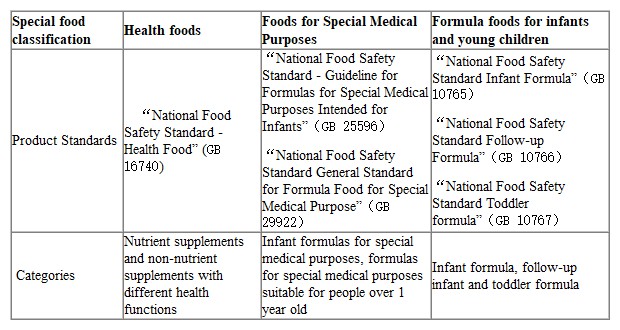
In China, there are different classifications of foods in different regulations or standards. In general, food classifications include special foods, special dietary foods, other normal foods, etc. So how are special foods and special dietary foods distinguished? What is the specific basis? Foodmate will take you through it.
Ⅰ. What are special foods
Special foods in the Food Safety Law include health foods, foods for special medical purposes, and formula foods for infants and young children. Specific product implementation standards and product classification are as follows:

The special manifestations of the above three types of food are subject to strict management by the state. The production of special food not only requires a food production license, but also needs to be registered or filed with the food safety supervision and management department.
Ⅱ. What are special dietary foods?
The National Food Safety Standard for Labeling of Prepackaged Foods for Special Dietary (GB 13432) defines special dietary foods as“Foods being processed or formulated specially to meet special physical or physiological conditions and/or to meet special dietary needs under disease or disorder.”
Appendix A of GB 13432 clarifies that special dietary foods include:
Infant formula food
Supplementary foods for infants and young children
Food for special medical purpose(Except for varieties involved in infant formula foods for special medical purposes)
Auxiliary nutritional supplements
Sports nutrition foods and other special dietary foods with corresponding national standards
Ⅲ. Differences and connections between special foods and special dietary foods
From the above classification, we can see that special food is not the same as special dietary food. However, special food and special dietary food have overlapping categories. For example, health food only belongs to special food, while food for special medical purposes and infant formula food belong to both special food and special dietary food. Other auxiliary nutritional supplements and sports nutritional foods are only classified as special dietary foods. According to the "Announcement of the State Administration for Market Regulation on Revising and Promulgating the Food Production License Classification Catalog", nutritional supplements for pregnant women and lactating mothers are also included in other special dietary foods. At present, other special dietary food categories are still relatively small, with the continuous improvement of China's standard system, the categories of special dietary food will be enriched.
Ⅳ. Registration or filing requirements
According to the Food Safety Law, there are registration or filing requirements for special foods. Health foods using raw materials beyond the health food raw material catalog and health foods imported for the first time must be registered by the food safety supervision and administration department of the State Council. Health foods imported for the first time which belong to supplement nutrients such as vitamins and minerals shall be reported to the food safety supervision and administration department of the State Council for filing. Other health foods shall be reported to the food safety supervision and administration department of the people's government of the province, autonomous region, or municipality directly under the Central Government for filing.
Foods for special medical purpose belonging to both special foods and special dietary foods must be registered with the food safety supervision and administration department of the State Council. Product formulas of infant formula milk powder must be registered with the food safety supervision and administration department of the State Council. Infant formula food production enterprises should file food raw materials, food additives, product formulas, labels and other matters with the food safety supervision and management departments of the people's governments of provinces, autonomous regions and municipalities directly under the Central Government.
For other special dietary foods such as supplementary foods for infants and young children, sports nutrition foods, nutritional supplements and other special dietary foods with corresponding national standards, there is no requirement for registration or filing in China, therefore, they can be produced after applying for a production license. In addition, product labels of the above foods should comply with the requirements of the "National Food Safety Standard for Labeling of Prepackaged Foods for Special Dietary" (GB 13432-2013) and corresponding product standards.
Ⅴ. Label requirements
The labels and instructions of health food shall not involve the function of disease prevention and treatment, and the content shall be true and consistent with the content of registration or filing.
The content requirements of nutrients and (or) other nutritional components of special dietary foods have certain particularities, and there are special requirements for their label contents, such as energy and nutritional components, consumption methods, and labeling of suitable populations. "National Food Safety Standard for Labeling of Prepackaged Foods for Special Dietary" (GB13432) is applicable to the label of special dietary food, including nutrition label, special dietary food label must also meet the basic requirements of GB 7718; for the special dietary food that meets the claimed requirements of GB13432 content, if a functional claim is made for energy and/or nutrients, the functional claim terms shall be selected from the functional claim standard terms specified in GB 28050.
Summary
The management of production, operation or labeling of special foods and special dietary foods is stricter than that of ordinary foods. To ensure the production and operation process meet the requirements, food producers and operators should pay attention to the corresponding standards and regulations. Foodmate has many years of experience in providing consulting service related to food import and export, please contact us for further information via global_info@foodmate.net.